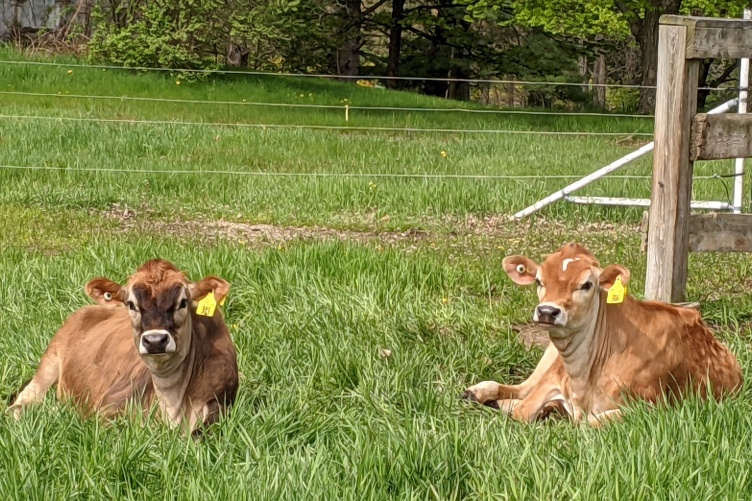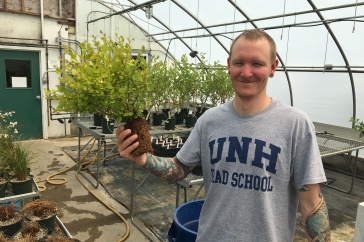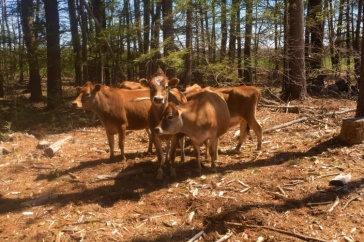
Scientists will discuss their research findings about improving colostrum quality and quantity at a Dairy Research Field Day Tuesday, June 15, 2021.
Colostrum, the first milk calves drink, is essential to building the immune systems of the calves, and thus, their survival. At the New Hampshire Agricultural Experiment Station in the UNH College of Life Sciences and Agriculture, scientists have focused on how to improve the quality and quantity of colostrum.
They will discuss their research findings about improving colostrum quality and quantity at a Dairy Research Field Day Tuesday, June 15, 2021. The event will take place at 6 p.m. online via Zoom. Registration is required.
Panelists for the one-hour Dairy Research Field Day will be experiment station scientist Peter Erickson, professor of dairy management; Tess Stahl, doctoral student in agriculture, nutrition, and food systems; and Kayla Aragona, who received her Ph.D. from UNH in 2018 under Erickson’s mentorship and now works as the Northeast Dairy Calf Specialist for Cargill-Provimi. The field day will be hosted by Anton Bekkerman, director of the NH Agricultural Experiment Station.
“Calves are the foundation of the herd and are necessary to replace the cows that leave the herd for various reasons. They also are the third greatest cost for the dairy producer, behind feed and labor, respectively. Reducing health costs and improving growth will result in a better bottom line for the producer,” Erickson said.
Stahl and Erickson will present preliminary findings on research that focuses on low colostrum production in Jersey cows. Erickson will discuss how feeding prepartum dairy cows the vitamin niacin prior to giving birth improved the quality of their colostrum. Aragona, who worked on the niacin research with Erickson, will present a needs assessment regarding colostrum in the dairy industry.
According to Stahl, researchers recently observed that Jersey cows reduce the production of colostrum in the winter months. In addition, cows appear to have a full udder, but do not release colostrum until 12 hours later, which may be too late to provide adequate immune development in calves.
When dairy farms run out of colostrum, they must rely on colostrum replacers (dehydrated colostrum), which are very expensive. “Increasing maternal colostrum in this breed of dairy cow will have a direct impact on farmers and dairy operating expenses because they will not have to purchase expensive colostrum replacer,” Stahl said.
Aragona and Erickson found that supplemental niacin to dams increased the immunoglobulin G – the main antibody for cattle – concentration and yield when dams were fed niacin for four weeks before calving. In addition, calves fed this colostrum responded by increasing feed efficiency. This suggests that there is a component in colostrum that may stimulate intestinal development, resulting in an enhanced uptake of nutrients.
“Sixty percent of the colostrum produced in the United States is considered poor quality. Our goal is to provide dairy producers with ways to improve the health of their replacement heifers,” Erickson said.
The United States is home to 51,500 dairy farms and 9 million dairy cows. According to Granite State Dairy Promotion, New Hampshire has 94 dairy farms and the industry impacts state and local economies with more than $141 million in total output and more than $19 million in labor income. Dairy farming also helps support many businesses related to the production of milk such as feed companies, milking equipment suppliers, tractor dealerships and milk processors. The profitability and sustainability of dairy farming depends on efficient management practices that result in maximizing milk production at a minimum monetary and environmental cost.
This material is based upon work supported by the NH Agricultural Experiment Station, through joint funding of the National Institute of Food and Agriculture, U.S. Department of Agriculture, under award numbers 1016574, 1001283, and multistate project NC2042, and the state of New Hampshire. This research also was supported by DSM and the George Walker Milk Research Fund.
Founded in 1887, the NH Agricultural Experiment Station at the UNH College of Life Sciences and Agriculture is UNH’s first research center and an elemental component of New Hampshire's land-grant university heritage and mission. We steward federal and state funding, including support from the USDA National Institute of Food and Agriculture, to provide unbiased and objective research concerning diverse aspects of sustainable agriculture and foods, aquaculture, forest management, and related wildlife, natural resources, and rural community topics. We maintain the Woodman and Kingman agronomy and horticultural research farms, the Macfarlane Research Greenhouses, the Fairchild Dairy Teaching and Research Center, and the Organic Dairy Research Farm. Additional properties also provide forage, forests, and woodlands in direct support to research, teaching, and outreach.
-
Written By:
Lori Tyler Gula, PhD | NH Agricultural Experiment Station | lori.gula@unh.edu | 603-862-1452


















































